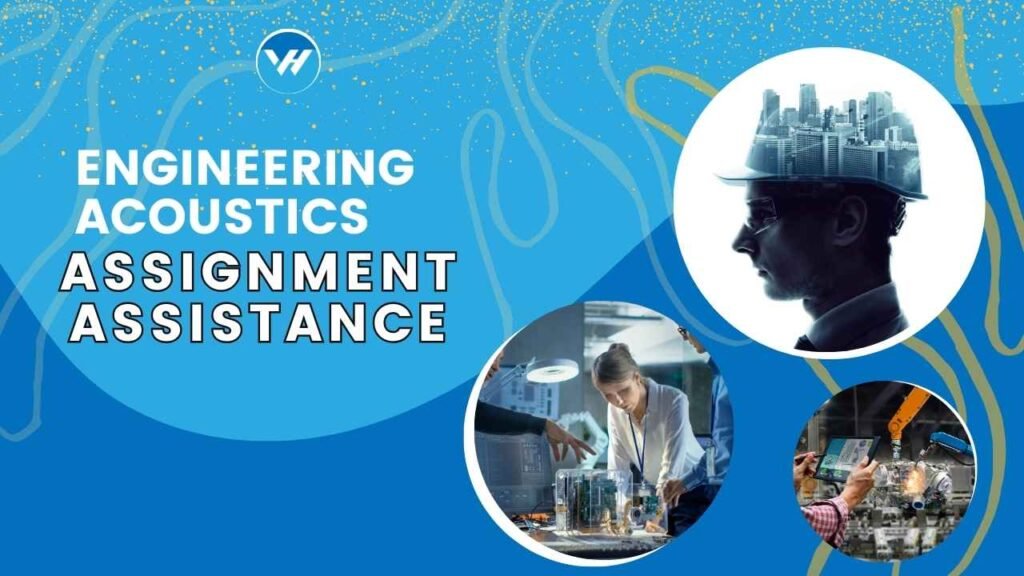Hey there! Ever wondered why concert halls sound so amazing or how noise-canceling headphones work? Welcome to the fascinating world of Engineering Acoustics! This field blends science and technology to control sound, making our lives more comfortable and enjoyable. But let’s be honest, tackling assignments in this subject can be a real headache. That’s where Virtual Help steps in, your go-to platform for finding tutors and getting the assignment help you need. Ready to dive in?

Table of Contents
ToggleWhat is Engineering Acoustics?
Definition and Scope
Engineering Acoustics is the study of sound and vibration, focusing on their production, control, transmission, and effects. It covers everything from the design of quieter cars to creating better hearing aids. Pretty cool, right?
Key Concepts in Engineering Acoustics
To get a grip on this subject, you need to understand several key concepts:
- Sound Waves: These are disturbances that travel through a medium (like air or water) and are the fundamental building blocks of acoustics.
- Frequency and Amplitude: Frequency determines the pitch of the sound, while amplitude affects its loudness.
- Acoustic Impedance: This concept helps in understanding how much sound pressure is created by a given air movement, crucial for designing efficient sound systems.
Applications of Engineering Acoustics
Environmental Noise Control
Imagine living next to a busy highway without the constant hum of traffic. Engineering acoustics makes that possible by designing barriers and implementing regulations to reduce noise pollution. For example, sound barriers along highways and strategic urban planning can significantly reduce noise levels, making urban living more comfortable.
Architectural Acoustics
Ever noticed how your voice sounds in a big empty room versus a furnished one? Acoustic engineers design spaces like theaters and recording studios to optimize sound quality. They use materials and structural designs that enhance sound clarity and reduce unwanted echoes, ensuring the best acoustic experience for audiences and performers alike.
Acoustic Engineering in Transportation
From quieter engines to better soundproofing, acoustic engineers make our journeys more pleasant and less noisy. Modern cars and airplanes are designed with acoustic materials and technologies that minimize engine noise, providing a quieter and more comfortable travel experience.
Medical Applications
Acoustics play a critical role in medical devices like ultrasound machines and hearing aids, improving diagnostics and quality of life for patients. Ultrasound technology, for example, uses high-frequency sound waves to create images of internal body structures, aiding in accurate diagnoses and treatments.
Challenges in Engineering Acoustics Assignments
Complex Mathematical Modeling
You’ll need to crunch some serious numbers. The mathematical models used to predict sound behavior can be quite challenging. These models often involve differential equations and complex algorithms that require a deep understanding of both mathematics and physics.
Understanding Acoustic Materials
Different materials absorb and reflect sound in various ways. Understanding these properties is crucial for effective sound control. For instance, porous materials like foam are excellent at absorbing sound, while dense materials like concrete reflect it.
Simulation and Analysis
Software tools are essential for simulating sound environments and analyzing data, but they come with a steep learning curve. Mastering these tools requires practice and a solid understanding of their underlying principles.
How Virtual Help Can Assist
Overview of Virtual Help Services
Virtual Help is your ultimate study buddy, offering a range of services to make your academic life easier. From finding the best tutors to providing detailed assignment help, they’ve got you covered.
Benefits of Using Virtual Help for Engineering Acoustics
- Expert Guidance: Learn from professionals who know the ins and outs of the field. These experts can help you grasp complex concepts and solve challenging problems.
- Time Management: Get help with complex topics, freeing up your time for other subjects. This balance is crucial for maintaining good academic performance across all your courses.
- Boosted Grades: Improve your understanding and, ultimately, your grades. With the right support, you can excel in your assignments and exams.
Features of Virtual Help Platform
User-Friendly Interface
Navigating through Virtual Help is a breeze, even if you’re not a tech wizard. Everything is designed to be intuitive and easy to use, ensuring a smooth and enjoyable user experience.
Access to Expert Tutors
You’ll have access to a pool of expert tutors ready to assist you with any aspect of your engineering acoustics assignments. These tutors are experienced professionals who can provide personalized guidance and support.
24/7 Availability
Got a question at 2 AM? No problem! Virtual Help is available round the clock, ensuring you get assistance whenever you need it. This flexibility is perfect for students with busy schedules or those who study at unconventional hours.
Personalized Learning Plans
Tailor your learning experience to fit your needs with personalized plans that address your specific challenges and goals. These plans are designed to help you make the most of your study time and achieve your academic objectives.
Getting Started with Virtual Help
How to Sign Up
Signing up is quick and easy. Just head to the Virtual Help website or download the app, fill in your details, and you’re good to go. The registration process is straightforward, ensuring you can start receiving assistance as soon as possible.
Navigating the Platform
Once you’re in, explore the dashboard to find all the tools and resources at your disposal. It’s designed to make your life simpler, with clear instructions and user-friendly features.
Finding the Right Tutor for Engineering Acoustics
Use the search function to find tutors who specialize in engineering acoustics. Check out their profiles, read reviews, and choose the best fit for you. You can even schedule trial sessions to ensure you’re comfortable with your chosen tutor.
Tips for Excelling in Engineering Acoustics Assignments
Effective Study Strategies
Break down complex topics into manageable chunks, use diagrams and flowcharts, and don’t hesitate to ask questions. Regularly review your notes and stay organized to keep track of your progress.
Utilizing Online Resources
Make the most of online lectures, forums, and articles. The internet is brimming with useful information. Websites like Khan Academy, Coursera, and academic journals can provide valuable insights and supplementary learning materials.
Practical Hands-On Projects
Nothing beats hands-on experience. Try to work on projects that allow you to apply theoretical knowledge practically. Build simple acoustic devices, conduct experiments, and analyze real-world sound environments to deepen your understanding.
Common Mistakes to Avoid
Misunderstanding Acoustic Principles
Ensure you have a strong grasp of the basics before moving on to more complex topics. Misunderstanding fundamental principles can lead to errors in your assignments and projects.
Neglecting the Importance of Simulations
Simulations are vital. They help you visualize and understand sound behavior in different environments. Make sure you invest time in learning simulation software and applying it to your assignments.
Overlooking Environmental Factors
Always consider the environment in which sound is being produced and received. It makes a big difference. Factors like room size, shape, and materials can significantly affect acoustic properties.
The Future of Engineering Acoustics
Emerging Trends
Keep an eye on the latest trends, like the use of AI in sound analysis and new materials for better soundproofing. Staying updated with industry developments can give you a competitive edge in your studies and future career.
Innovations in Acoustic Engineering
Innovations are constantly emerging, offering new tools and techniques for better sound control and analysis. For example, advancements in digital signal processing and acoustic metamaterials are revolutionizing the field.
Potential Career Opportunities
The field is growing, with opportunities in various sectors, including healthcare, entertainment, and environmental management. Acoustic engineers are in demand for their expertise in designing quieter and more efficient systems.
Conclusion
Engineering acoustics is a fascinating field with immense potential. Whether you’re struggling with assignments or just want to learn more, Virtual Help is here to assist you every step of the way. Dive in, explore, and make the most of the resources available to you. With dedication and the right support, you can master this exciting subject and open up a world of opportunities.
FAQs
What is Engineering Acoustics?
Engineering Acoustics is the study of sound and vibration, focusing on their production, control, transmission, and effects. It encompasses various applications, from designing quieter environments to developing advanced medical devices.
How can Virtual Help assist with Engineering Acoustics assignments?
Virtual Help provides expert tutors, personalized learning plans, and 24/7 support to help you excel in your assignments. The platform offers a range of resources and tools tailored to your specific needs, ensuring you get the best possible assistance.
What are the career prospects in Engineering Acoustics?
There are numerous opportunities in sectors like healthcare, entertainment, environmental management, and more. Acoustic engineers are in high demand for their skills in designing effective sound control systems and innovative acoustic solutions.
How do I choose the right tutor on Virtual Help?
Use the search function to find tutors specializing in engineering acoustics. Review their profiles, read feedback from other students, and choose the one that best fits your learning style and needs. Trial sessions can also help you make an informed decision.
What are some common mistakes to avoid in Engineering Acoustics assignments?
Common mistakes include misunderstanding basic acoustic principles, neglecting the importance of simulations, and overlooking environmental factors. Ensuring a solid grasp of fundamental concepts and considering all relevant variables can help you avoid these pitfalls.





